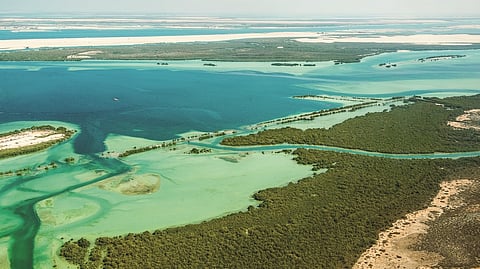Abu Dhabi to host 2025 IUCN World Conservation Congress
A significant update to the IUCN Red List of Threatened Species will also be announced

The Ministry of Climate Change and Environment, in cooperation with the Environment Agency – Abu Dhabi, will host the 2025 IUCN World Conservation Congress in Abu Dhabi from October 9 to 15. The global gathering, organized under the umbrella of the International Union for Conservation of Nature (IUCN), reflects the UAE’s commitment to advancing international efforts to protect the environment and biodiversity. The Congress is expected to unveil major global initiatives that will shape the future of environmental action and strengthen international collaboration to protect nature.
Innovative, transformative solutions
The Congress serves as the world’s most inclusive platform for conservation, bringing together government leaders, youth, scientists, civil society, and the private sector to collaborate on innovative and transformative environmental solutions, guided by shared visions and ambitious environmental leadership.
Among the most anticipated announcements is a significant update to the IUCN Red List of Threatened Species—the world’s most comprehensive reference for assessing species’ risk of extinction. Updates will include the global Red List as well as the new European Red List of Threatened Species, with a special focus on pollinators and their vital role in ecosystems.
The Congress will also feature the launch of the latest IUCN World Heritage Outlook, providing a global assessment of natural World Heritage sites and the challenges they face. In addition, the IUCN will announce winners of the Cullman Medal and the John C. Phillips Memorial Medal, honoring exceptional contributions to conservation, as well as the 2025 International Ranger Awards, recognizing frontline champions safeguarding the planet’s most fragile ecosystems. The host country of the next IUCN World Parks Congress will also be revealed.
UAE’s legacy of conservation
The UAE’s legacy in nature conservation stems from the vision of the late Sheikh Zayed bin Sultan Al Nahyan, the nation’s Founding Father, who launched reintroduction programs for endangered species and banned hunting of wild birds as early as the 1970s.
Today, the UAE stands among global leaders in protecting nature and restoring coastal and marine ecosystems, with a national pledge to plant 100 million mangroves by 2030.
Dr. Amna Al Dahak, UAE Minister of Climate Change and Environment, stated:
“Guided by the visionary leadership of our nation, the UAE continues to strengthen its role as a global hub for practical, innovative solutions to environmental and biodiversity challenges. Today, the UAE is home to 49 protected areas covering about 15.5% of the country’s territory—demonstrating our deep commitment to safeguarding ecosystems and natural habitats. We also lead pioneering reintroduction programs for endangered species, both locally and globally.”
Dr. Shaikha Al Dhaheri, Secretary-General of the Environment Agency – Abu Dhabi and IUCN Regional Councillor for West Asia, added:
“We look forward to welcoming participants from across the globe to Abu Dhabi. The UAE’s vision has become a model of innovation, resilience, and inclusivity in conservation.”
IUCN Director General, Dr. Grethel Aguilar, noted: “This year’s Congress provides a critical opportunity to deliver real, science-based solutions supported by communities and grounded in clear policy frameworks.”
The IUCN Red List of threatened species
The IUCN Red List of Threatened Species, first established in 1964, is the world’s most comprehensive database on the conservation status of plant, animal, and fungal species. It classifies and monitors species globally, providing vital insights into their population status, habitats, threats, and conservation measures.
The Red List is widely recognized as a key indicator of global biodiversity health. It is not just a catalogue of species—it is an essential tool for shaping policy, guiding conservation priorities, and raising awareness of the urgent need to protect the natural resources upon which humanity depends.
Key facts about the Red List:
A global scientific effort to assess species and their conservation status.
Helps identify species at risk of extinction and prioritize protection efforts.
Relies on a global network of scientists and partner organizations.
How it supports conservation:
Information resource: The most comprehensive global source of data on species’ conservation status.
Focus of conservation efforts: Guides action toward species and habitats most in need of protection.
Decision-making tool: Provides evidence-based data to support future conservation planning.
Benefits:
Identifies species requiring urgent recovery measures.
Highlights critical sites and habitats for protection.
Strengthens global awareness of biodiversity conservation and sustainability.



